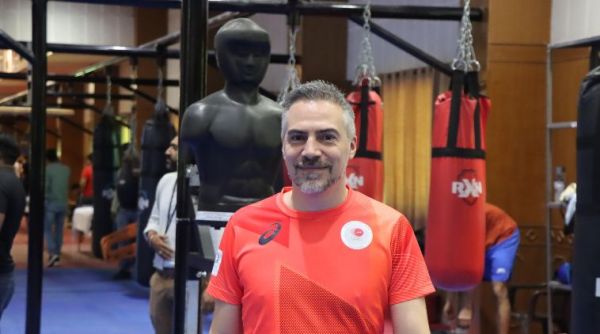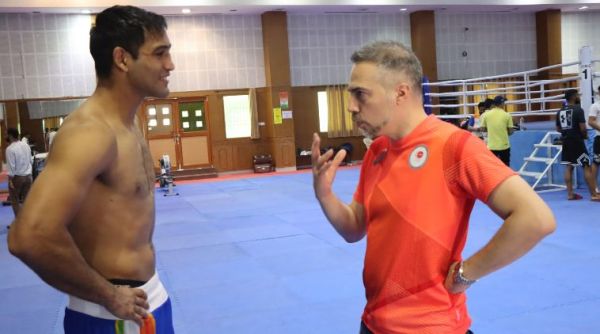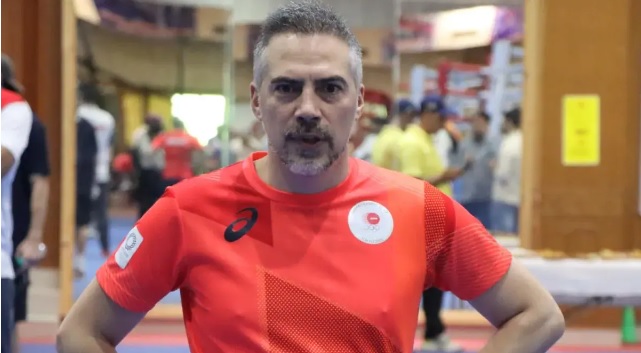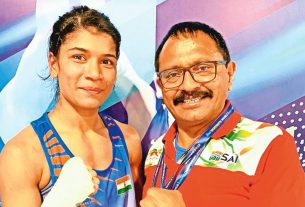‘If there is a boxer who has proven himself on the international level through exposure with coaches too investing in him, why put extra burden of trials on him,’ the Swede says.
Thank you for reading this post, don't forget to subscribe!Shared News: June 4, 2022 7:19:57 pm
Post the selection trials for the Indian men’s team for the Commonwealth Games, chief high-performance director Santiago Nieva was an emotional man. (Express photo by Jasbir Malhi)
Post the selection trials for the Indian men’s team for the Commonwealth Games, chief high-performance director Santiago Nieva was an emotional man. As the Swede completes his tenure before joining Australia as their head coach, he talks about various facets of Indian boxing, his policy of having no trials, the disappointments at the Tokyo Olympics and what lies ahead for Indian boxing.
Q. You joined the team in April 2017 and are leaving now after a five-year stint. What has been the main difference between then and now?
A. The main difference has been the high-performance structure that I tried to put in place. We needed good tactical and technical training and worked around that. There was much emphasis on strength and endurance earlier and I had to put the focus on power and tactics too.
Tactically speaking, our boxers were going head-hunting in the ring rather than aiming for more variations. We had to work on things like avoiding clinching the opponent or holding, and knowing how to come out of those situations.
Once it got into their heads, it became easier to train. The thing about top boxing nations like Russia, Cuba and Kazakhstan is that they start tactically right from the grassroots. A boxer at the age of say 16-17 has good ring IQ. And I tried to inculcate that.

The chief high-performance director Santiago Nieva was an emotional man. (Express photo by Jasbir Malhi)
Q. You have been an advocate for having no trials for boxers for international competitions like CWG, Asian Games or Olympic qualifiers. We have seen boxers like Nikhat Zareen and others demanding trials. What’s you take on this issue?
A. Well, in India, people are crazy about having trials. When I introduced this concept and policy of having no trials, obviously I faced resistance from the boxers who don’t qualify. I believe if there is a boxer who has proven himself on the international level through exposure with coaches too investing in him, why put extra burden of trials on him.
In some cases, where we have equally good boxers, trials are necessary. As the head coach, you should be able to take the decision based on the boxer’s assessment and back that boxer in a particular weight category. The recent qualification system for the Paris Olympics has reduced the number of qualifiers and put more emphasis on world rankings.
If we back one boxer, who has regular good performances at international level, he will be able to collect more ranking points. Yes, having no trials is not a fool-proof system but that’s my view.
Boxing is in Hussamuddin’s blood. His father Mohammed Samsamuddin is a boxing coach and his brothers Etheshamuddin and Itishmuddin are pugilists and Indian internationals.
✍️@Nitinsharma631https://t.co/Aywb1i4jTc
— Express Sports (@IExpressSports) June 3, 2022
Q. What will be the highlight of your stint?
A. There are several highs for me. Seeing Amit Panghal box in the world championship final in 2019, where we won two medals and four boxers reaching the quarters, was definitely one of the high points of my career, apart from the Indian contingent winning 13 medals in the 2019 Asian Championships.
But the best moment has to be Amit beating reigning Olympic champion Hasanboy Dusmatov in the Asian Games final in 2018. That made us believe that anything is possible and gave rise to the desire to aim for a medal at the Olympics for each boxer.
Q. And what has been the low point of your stint?
A. Well, Tokyo has to be the low point in terms of men’s boxing. There is no secret that we could not deliver according to our expectations and no hiding from the fact that we did not win a medal. People ask me to do an analysis and I only have to say that sadly, it happened at the Olympics.
We have to understand that all our boxers lost to good opponents. The Colombian (Yuberjen Martinez), whom Amit lost to, is a 2016 Olympic medallist and if you asked me two months prior to the Olympics, I would have said Amit would defeat him. In Italy, he dominated Amit three times in sparring sessions. We thought that in the Olympics, Amit will be able to use the bigger ring better and Amit showed that winning the first round.
But for that, he had to spend a lot of energy and got tired in the next two rounds. Manish lost to a very good boxer. Vikas got injured in Italy but as coaches, we took a decision to take a risk. If it was any other competition, we could have pulled him out. We were sure that even if he was not 100 percent fit, he could handle it with all the experience. Unfortunately, he reinjured himself and Mensa Okazawa was very good.
Our best boxer at the Olympics was Satish, who came close to winning a medal but faced somebody like Bakhodir Jalolov. We did not qualify any women boxers for Rio but qualified four women boxers for Tokyo. To return with one medal, where few countries medalled more than once, is a good achievement.
Q. Women’s high-performance manager Raffaele Bergamasco quit due to the non-extension of his contract last year. Under him, the women boxers returned with an Olympic medal. How do you see his departure?
A. Obviously, it was a big loss for Indian boxing. It was difficult that he took such a decision and we have to respect that. If we look at the results, he had a very successful journey in India and Indians owe him for playing a role in Lovlina’s (Borgohain) bronze medal, India’s only third medal in the sport.
𝗕𝗮𝗱𝗮𝗹 𝗣𝗲 𝗣𝗮𝗼𝗻 𝗛𝗮𝗶𝗻 😍
Blessing your feed with a happy picture of our Olympic medalist- @LovlinaBorgohai & coach Raffaele Bergamasco 📸#RingKeBaazigar#Boxing#Tokyo2020#TeamIndia#Cheer4India pic.twitter.com/4tPl2YwJ4x
— Boxing Federation (@BFI_official) August 4, 2021
Q. There has been some criticism of the Indian team training in Italy ahead of the Olympics. Boxers like Vikas Krishan have termed the lack of Indian food options as one of the reasons for failure in Tokyo. Do you believe that the training stint in Italy played a role in what happened with Indian boxers in Tokyo?
A. We have to understand that it was not our plan to spend so much time ahead of the Olympics in Italy. We had a meeting with boxers and everybody in the men’s camp agreed for a 2-3 week camp in Italy. Among women’s boxers, only Mary Kom said she will be training in India.
The plan was to spend 2-3 weeks in Italy and come back to India and then go to the Olympics. But as the Covid-19 situation changed, the government told us that we have to quarantine if we come back to India. So, we had to make that decision of staying in Italy for longer.

Santiago Nieva said that there was much emphasis on strength and endurance earlier and I had to put the focus on power and tactics too. (Express photo)
The reason we chose Italy was that we felt it would suit us. Columbia and Ecuador teams were training there and later the France and Azerbaijan teams also trained there. Yes, food was a problem for the extended stay and they helped us with whatever they could have done. But nobody had complained when we trained at the same venue before the world championships or Olympic qualifiers and gave results.
To say Italy is the sole reason for what happened in the Olympics is to simplify things. It is our responsibility as coaches, boxers and the whole programme.
Q. Looking forward, how do you see Indian boxing grow and what will be your advice to Indian boxers?
A. Indian boxing has to look forward. Losing is part of the game and yes, we failed in Tokyo except that one medal but we have to build on the process. Remember, two world champions lost in the first round in Tokyo.
A country like France, which won six medals in Rio, did not win a medal in Tokyo. If you want somebody to take the responsibility of failure, I will take it. But I am happy that we have a coaching structure and a thing called high-performance management in place in Indian boxing. What we should aim for is to have a good internal competition structure throughout the year.
Prior to Covid-19, we had a team in WSB (World Series of Boxing), had pro nights and pro leagues, and focus should be on providing the boxers a competitive atmosphere all the time.



